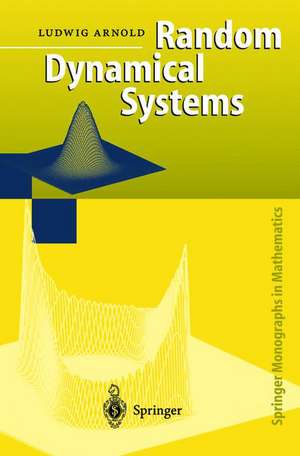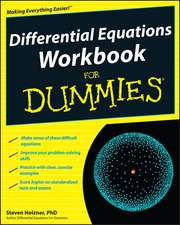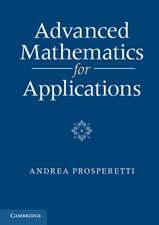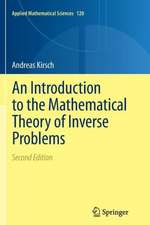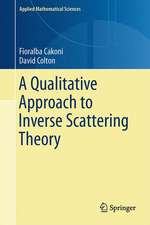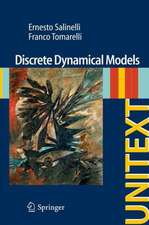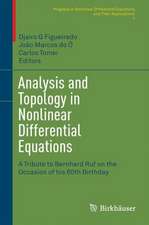Random Dynamical Systems: Springer Monographs in Mathematics
Autor Ludwig Arnolden Limba Engleză Hardback – 19 aug 1998
| Toate formatele și edițiile | Preț | Express |
|---|---|---|
| Paperback (1) | 795.83 lei 6-8 săpt. | |
| Springer Berlin, Heidelberg – 15 dec 2010 | 795.83 lei 6-8 săpt. | |
| Hardback (1) | 802.28 lei 6-8 săpt. | |
| Springer Berlin, Heidelberg – 19 aug 1998 | 802.28 lei 6-8 săpt. |
Din seria Springer Monographs in Mathematics
- 18%
 Preț: 1234.77 lei
Preț: 1234.77 lei - 18%
 Preț: 753.23 lei
Preț: 753.23 lei - 20%
 Preț: 574.70 lei
Preț: 574.70 lei - 24%
 Preț: 740.03 lei
Preț: 740.03 lei - 24%
 Preț: 777.43 lei
Preț: 777.43 lei - 20%
 Preț: 818.29 lei
Preț: 818.29 lei - 18%
 Preț: 969.93 lei
Preț: 969.93 lei - 20%
 Preț: 758.03 lei
Preț: 758.03 lei - 9%
 Preț: 904.20 lei
Preț: 904.20 lei - 15%
 Preț: 607.33 lei
Preț: 607.33 lei - 8%
 Preț: 529.41 lei
Preț: 529.41 lei - 24%
 Preț: 1598.61 lei
Preț: 1598.61 lei -
 Preț: 396.40 lei
Preț: 396.40 lei - 18%
 Preț: 793.14 lei
Preț: 793.14 lei - 15%
 Preț: 650.86 lei
Preț: 650.86 lei - 18%
 Preț: 1236.19 lei
Preț: 1236.19 lei - 15%
 Preț: 499.77 lei
Preț: 499.77 lei -
 Preț: 391.61 lei
Preț: 391.61 lei - 18%
 Preț: 1404.30 lei
Preț: 1404.30 lei - 18%
 Preț: 797.24 lei
Preț: 797.24 lei - 18%
 Preț: 916.25 lei
Preț: 916.25 lei -
 Preț: 397.01 lei
Preț: 397.01 lei - 15%
 Preț: 657.25 lei
Preț: 657.25 lei - 15%
 Preț: 467.79 lei
Preț: 467.79 lei - 15%
 Preț: 648.05 lei
Preț: 648.05 lei -
 Preț: 406.25 lei
Preț: 406.25 lei -
 Preț: 389.88 lei
Preț: 389.88 lei - 15%
 Preț: 649.54 lei
Preț: 649.54 lei - 15%
 Preț: 581.14 lei
Preț: 581.14 lei - 15%
 Preț: 643.48 lei
Preț: 643.48 lei - 15%
 Preț: 647.73 lei
Preț: 647.73 lei - 18%
 Preț: 902.55 lei
Preț: 902.55 lei - 15%
 Preț: 653.33 lei
Preț: 653.33 lei - 18%
 Preț: 901.88 lei
Preț: 901.88 lei - 18%
 Preț: 907.27 lei
Preț: 907.27 lei - 18%
 Preț: 893.53 lei
Preț: 893.53 lei - 15%
 Preț: 659.53 lei
Preț: 659.53 lei - 15%
 Preț: 661.32 lei
Preț: 661.32 lei - 15%
 Preț: 646.62 lei
Preț: 646.62 lei -
 Preț: 384.48 lei
Preț: 384.48 lei - 15%
 Preț: 704.36 lei
Preț: 704.36 lei - 18%
 Preț: 1248.20 lei
Preț: 1248.20 lei - 18%
 Preț: 1031.17 lei
Preț: 1031.17 lei -
 Preț: 409.13 lei
Preț: 409.13 lei - 18%
 Preț: 986.01 lei
Preț: 986.01 lei - 15%
 Preț: 640.37 lei
Preț: 640.37 lei - 15%
 Preț: 643.34 lei
Preț: 643.34 lei -
 Preț: 388.72 lei
Preț: 388.72 lei - 18%
 Preț: 965.34 lei
Preț: 965.34 lei
Preț: 802.28 lei
Preț vechi: 978.39 lei
-18% Nou
Puncte Express: 1203
Preț estimativ în valută:
153.52€ • 164.16$ • 127.100£
153.52€ • 164.16$ • 127.100£
Carte tipărită la comandă
Livrare economică 18 aprilie-02 mai
Preluare comenzi: 021 569.72.76
Specificații
ISBN-13: 9783540637585
ISBN-10: 3540637583
Pagini: 612
Ilustrații: XV, 586 p.
Dimensiuni: 155 x 235 x 41 mm
Greutate: 1.03 kg
Ediția:1998
Editura: Springer Berlin, Heidelberg
Colecția Springer
Seria Springer Monographs in Mathematics
Locul publicării:Berlin, Heidelberg, Germany
ISBN-10: 3540637583
Pagini: 612
Ilustrații: XV, 586 p.
Dimensiuni: 155 x 235 x 41 mm
Greutate: 1.03 kg
Ediția:1998
Editura: Springer Berlin, Heidelberg
Colecția Springer
Seria Springer Monographs in Mathematics
Locul publicării:Berlin, Heidelberg, Germany
Public țintă
ResearchCuprins
I. Random Dynamical Systems and Their Generators.- 1. Basic Definitions. Invariant Measures.- 2. Generation.- II. Multiplicative Ergodic Theory.- 3. The Multiplicative Ergodic Theorem in Euclidean Space.- 4. The Multiplicative Ergodic Theorem on Bundles and Manifolds.- 5. The MET for Related Linear and Affine RDS.- 6. RDS on Homogeneous Spaces of the General Linear Group.- III. Smooth Random Dynamical Systems.- 7. Invariant Manifolds.- 8. Normal Forms.- 9. Bifurcation Theory.- IV. Appendices.- Appendix A. Measurable Dynamical Systems.- A.1 Ergodic Theory.- A.2 Stochastic Processes and Dynamical Systems.- A.3 Stationary Processes.- A.4 Markov Processes.- Appendix B. Smooth Dynamical Systems.- B.1 Two-Parameter Flows on a Manifold.- B.4 Autonomous Case: Dynamical Systems.- B.5 Vector Fields and Flows on Manifolds.- References.
Recenzii
"Ludwig Arnold's monograph is going to make a very big impact for many years to come."
DMV Jahresbericht, 103. Band, Heft 2, July 2001
DMV Jahresbericht, 103. Band, Heft 2, July 2001
Textul de pe ultima copertă
This book is the first systematic presentation of the theory of random dynamical systems, i.e. of dynamical systems under the influence of some kind of randomness. The theory comprises products of random mappings as well as random and stochastic differential equations. The author's approach is based on Oseledets'multiplicative ergodic theorem for linear random systems, for which a detailed proof is presented. This theorem provides us with a random substitute of linear algebra and hence can serve as the basis of a local theory of nonlinear random systems. In particular, global and local random invariant manifolds are constructed and their regularity is proved. Techniques for simplifying a system by random continuous or smooth coordinate tranformations are developed (random Hartman-Grobman theorem, random normal forms). Qualitative changes in families of random systems (random bifurcation theory) are also studied. A dynamical approach is proposed which is based on sign changes of Lyapunov exponents and which extends the traditional phenomenological approach based on the Fokker-Planck equation. Numerous instructive examples are treated analytically or numerically. The main intention is, however, to present a reliable and rather complete source of reference which lays the foundations for future works and applications.
Caracteristici
This is the first comprehensive monograph on this active subject, dealing with the fundamentals through to current research, and written by one of the leaders in the field. Includes supplementary material: sn.pub/extras
